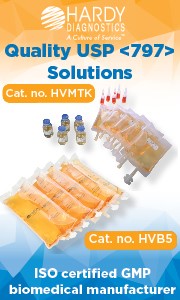| FREE TRIAL FORMULATIONS MY ACCOUNT | |
 | |
| Our Compounding Knowledge, Your Peace of Mind | |
| April 12, 2019 | Volume 16 | Issue 15 | |
| |||||
| |||||
|
Question: What are the FDA priorities for compounding for 2019? Answer:
Statement from FDA Commissioner Scott Gottlieb, M.D. and Deputy Commissioner Anna Abram on new 2019 efforts to improve the quality of compounded drugs Statement (Opening) Maintaining Quality Manufacturing and Compliance
Also, we’ll continue our effort to help compounders to identify insanitary conditions in compounding facilities so they can implement appropriate corrective actions. We’ve highlighted some of the poor conditions that our investigators have found at some facilities. To help prevent these practices, we’ll work to finalize our guidance to promote activities that help compounders ensure their drugs are not prepared, packed, or held under insanitary conditions. While some compounders work hard to meet quality standards including avoiding insanitary conditions, we recognize that there are still compounders that are not in compliance. To address these risks, a key component of our 2019 work will be continuing to perform our risk-based inspection and pursue other enforcement efforts to identify compounders who produce drugs under substandard conditions or use inappropriate practices that could lead to serious harm. In 2018, the FDA sent warning letters to 23 facilities for adulterated product violations. These include insanitary conditions. We also worked with compounders on 50 recalls of products from the marketplace that raised safety concerns. Since 2018, FDA has entered into four consent decrees of permanent injunction to address the risk of patient harm from exposure to unsafe compounded drugs. In 2019, we’ll build on these and similar efforts, advance other new policies to strengthen our regulatory oversight and continue to help improve the quality of compounded drugs.� Regulating Compounding from Bulk Drug Substances Finalizing our Memorandum of Understanding with the States Compounding by Hospital and Health Systems Additional Compounding priorities Note: We will continue to provide the text for each of the sections over the next few weeks; meanwhile, the complete statement can be obtained at:
| |||||
|
News Harm Reported from Sudden Discontinuation of Opioid Pain Medicines
Expanding Access to Genetics/Genomics/Pharmacogenomics Competency Education
More Antibiotic Rx from Pediatric Telemedicine Visit
List of the Top 15 Pharma Companies by 2018 Revenue.
| |||||
|
Did You Know ... …that Audrey Hepburn (Golden Days of Hollywood Actress) said the following? “Make-up can only make you look pretty on the outside, | |||||
|
Tip of the Week One often wonders what our society would be like if we spent as much time fixing up our insides as we do on fixing up our outsides! | |||||
|
IJPC Now on Facebook and Youtube Become a fan of the IJPC Facebook page and share ideas, photos, and keep up to date with the latest compounding information - http://www.facebook.com/IJPCompounding View our growing collection of educational and training videos at www.ijpc.com/video or by subscribing to our Youtube channel at https://www.youtube.com/IJPCompounding. | |||||
|
Looking Back Listen birds,
|
| Copyright 2019 International Journal of Pharmaceutical Compounding, Inc. 122 N Bryant Ave, Edmond OK 73034 |
Manage my Email: Subscribe / Un-Subscribe |
Comments or Questions: info@compoundingtoday.com |
|
| Reprints & Permissions: Reprints@ijpc.com | |||



